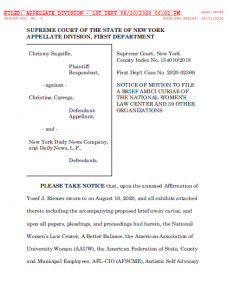Abortion rights, women of color, and LGBTQIA+ people are under attack. Pledge to join us in fighting for gender justice.

Update: March 9, 2021 – A New York appellate court reversed the lower court’s decision and directed it to dismiss all claims against Christina. Citing NWLC’s amicus brief, the appellate court called the lower court’s ruling “an unacceptable result” that “rings of the outdated assumptions that have plagued sexual assault victims over time” and that would have “the effect of dissuading a victim from seeking an order of protection” and “emboldening sexual assaulters who seek to weaponize the legal system in order to silence their victims.”
On August 10, 2020, the National Women’s Law Center, along with our law firm partner Kirkland & Ellis LLP, filed an amicus brief to the Supreme Court of the State of New York, Appellate Division, on behalf of 39 additional organizations, in support of Christina Carrega, a sexual assault survivor who was sued for defamation by the individual she named in her police report. Although New York law offers some protections against defamation liability for people who report misconduct, the court in Christina’s case held that she was not entitled to those protections solely because sexual assault was the type of misconduct she reported. The court also held that Christina could have lied about the sexual assault to advance her career.
NWLC’s brief requests the appellate court to reverse the decision below, specifically explaining that sexual assault is both prevalent and systemically underreported, and that carving sexual assault survivors out of protections against defamation liability will exacerbate underreporting. We also explain that survivors who do report—especially Black women like Christina—are often not believed and face retaliation, and that defamation lawsuits are increasingly weaponized by sexual harassers as another retaliatory tactic. In addition, we point out that survivors do not enjoy career benefits when they come forward; rather, many are fired from their jobs or even rejected by their industry. The brief emphasizes that courts must not allow defamation lawsuits against survivors to proceed based on such harmful and false sex stereotypes.
See our more on this case in our blog here.

